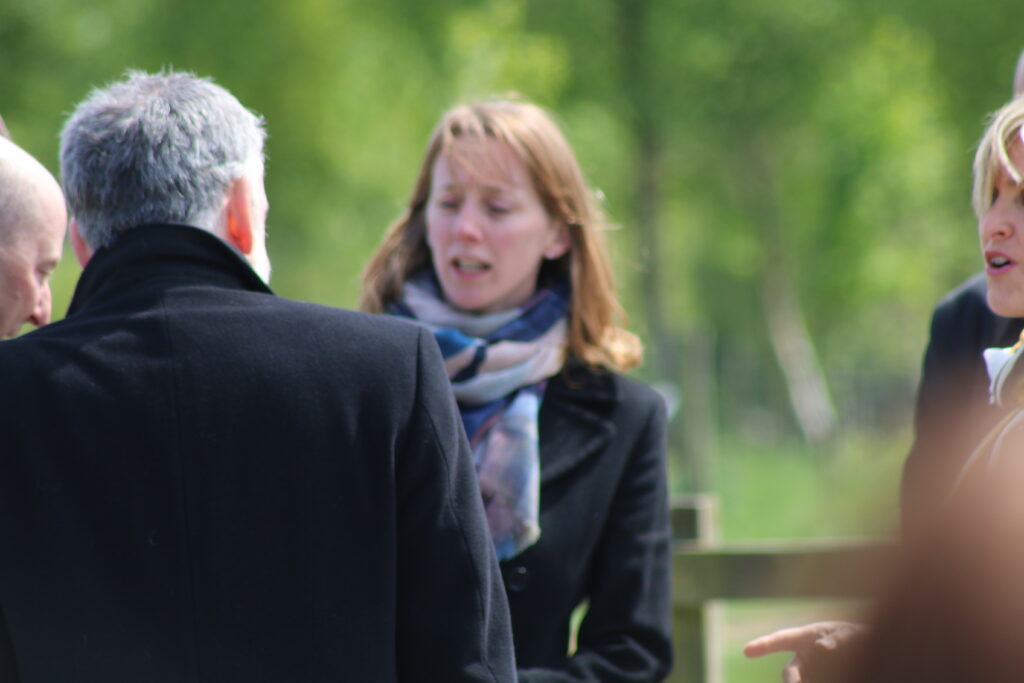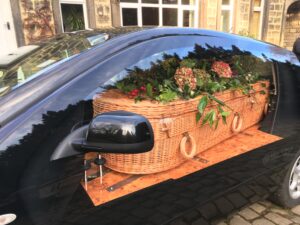

A Day In The Life Of A Funeral Director
Traditionally, funeral directing has happened behind closed doors creating an air of mystery about the profession and everything surrounding it. Funeral directors often joined the family business having grown up in it, and it was deemed respectful and dignified for the care of people who have died (and arranging funerals) to happen privately and out of sight.
For this reason, and perhaps a post-war desire to be less exposed to death, choosing to work in funeral care isn’t considered as proactively or readily as other branches of health and social care.
We recognise that the privacy surrounding funerals makes it very hard for people to know what it’s like to be a funeral director. It can be hard to know what questions to ask. As a modern funeral director that is seeking to encourage more open conversation about funerals and funeral directing as a career, we are keen to answer some of the questions people have and talk about what a typical day in the life of a funeral director is really like in 2021. My personal experience tells me that most people are naturally very interested in what it is like to be a funeral director and have many questions. Some people have many practical questions (often starting with “Do you also look after the dead people”), other are fascinated about funeral choices and many want to understand the emotional labour involved and what it “feels like” to help people to arrange a funeral.
As always, breaking down something complicated and human into its composite parts can end up oversimplifying it. However, I believe that there are six key strands to being a funeral director and I’ll try to tell you a little more about each one below.
I must also caveat everything by saying that the UK funeral industry is unregulated and there are no minimum standards to adhere to. This means that funeral directors can choose their own ways of working so it is hard for me to judge whether this blog would apply to every service.
We have also make a short video to compliment this blog so if you are interested, then please take a look at that too!
1) Looking after people who have died
After someone has died, we go to the place where they have died and bring them into our care (and usually look after people until the day of their funeral). Depending on the circumstances and the wishes of the person who has died and their family, this may involve delivering personal care, dressing someone, or doing their nails, hair and makeup.
Sometimes people also need some care which is exclusively for people after death. This depends on specific circumstances and we would always try to facilitate a family being involved in these decisions (gently and only if they want to). Most people have heard of embalming, which is an example of such a procedure.


2) Supporting people to make funeral arrangements
We spend much of our time helping people to understand what is possible and then creating time and space to support them to work out what works best for them. We start by trying to understand what is important to the person who has died and their family and friends and then expand on these ideas by structuring the decisions that need to be made and sharing ideas.
This might include needing to do some research about new options, places, or people so that we can suggest things which are specific to that individual.
Once the decisions have been made, then it is our job to pull everything together. This usually involves sourcing some funeral products (like coffins and urns), liaising with other people like Minister and celebrants and ensuring all the necessary paperwork has been completed in a timely manner.


3) Support on the day of the funeral
On the day of the funeral, we are there to make sure that the event is as the family and friends wanted it to be. In many cases, this involves ensuring that all the carefully prepared plans and timings are adhered to. However, sometimes that also involves navigating the unexpected and being able to make quick judgements and decisions about how to adapt the plan in response to unforeseen circumstances.
Roadblocks which have popped up in the hour since you last checked the route, an unwell funeral attendee, a hearse that refuses to start or a last-minute change of plan about whether family members would like to carry the coffin, are all things which we need to navigate calmly and quickly.


4) Pre- and post-funeral support
As funeral directors, we are well placed to support people to understand and write down their own funeral wishes or purchase a pre-paid funeral plan.
We know the benefit of people leaving funeral wishes and see how consoling it is for people to be able to gift the fulfilment of these wishes after someone has died. Many people we have supported to decide and articulate their wishes tell us that they have found it a positive experience and feel like an important task has been completed.
Similarly, because we support people who have been bereaved, we are well-placed to share helpful information about bereavement support, activities to support the development of continuing bonds and signpost to other services and organisations which might help. We also run a peer bereavement support group at our services but that is not the case for all funeral directors.


5) Raising awareness and standards
The more that people know about funerals, funeral choices and how funerals costs are calculated, the better. We believe that sharing this information gentle and carefully while people are not immediately faced with planning a funeral is best because they can then call upon this knowledge when they need to make many funeral decisions in a relatively short space of time.
We spend time sharing blogs (like this one), raising awareness about funeral choices, hosting talks and workshops and other educational events. We encourage other professionals allied to funeral care to come and share their perspective.
We also lead and contribute to funeral and bereavement research with several different universities so that we can help to gather the information that is needed to make sure that funeral directors know how to deliver the best possible (evidence-based) support to people who have been bereaved.


6) Having a positive impact on our communities and the environment
As funeral directors, you are an important part of your local community and it is rewarding to be able to make a positively contribution to this community. We do what we can to understand what individuals, groups and organisations are doing and try to provide support where we can. This can take many different forms, but the key is that is it driven by the needs of the community that we are in.
Like many people, we take our responsibility to the environment very seriously. We consider how to minimise the impact that we have as a business, try to make a positive contribution to any sustainability work taking place in the community and work hard to raise awareness about greener funeral choices.
Every single day is different, every individual that we support is special and our job is truly a privilege. We meet the most amazing people (personally and professionally) and are constantly reminded of how incredibly resilient people are – and it is an honour to be able to help.
If you have any questions about what it is like to be a funeral director (or anything else funeral related) then please don’t hesitate to get in touch via our Contact Us page or by emailing [email protected]
To receive our newsletters and information about new blogs – please sign up here.


